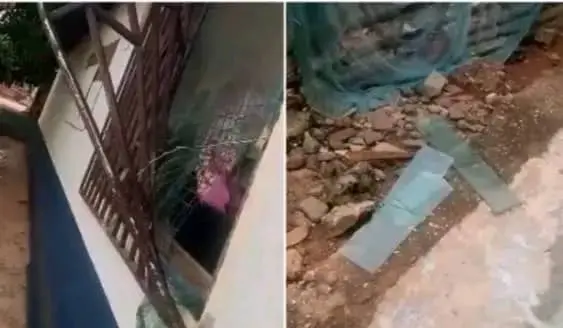The serene community of Sewhi Asafo in the Western North Region of Ghana was jolted by a brazen armed robbery targeting the local police station. Under the cover of darkness, a group of suspected robbers, displaying a concerning level of organization and familiarity with the station’s layout, breached the security perimeter by forcing their way through a reinforced window. This audacious act resulted in the theft of an AK-47 rifle, a significant quantity of ammunition, and other police property, raising serious concerns about the vulnerability of law enforcement infrastructure and the potential for these stolen weapons to be used in further criminal activities. The incident exposed security lapses within the police station, particularly the apparent unpreparedness of the officers on duty, who were seemingly caught off guard by the attack. The swiftness and precision of the robbery suggest a well-planned operation, possibly involving individuals with inside knowledge of the station’s security protocols.
The theft of an AK-47 rifle presents a grave danger to the community and the wider region. This weapon, known for its firepower and ease of use, significantly enhances the criminal capabilities of the robbers, enabling them to carry out more violent and potentially deadly attacks. The stolen ammunition further amplifies this threat, providing the perpetrators with the means to sustain their criminal operations. The incident underscores the critical need for enhanced security measures at police stations across the region to prevent similar occurrences in the future. The apparent ease with which the robbers gained access to the station and overran the officers on duty highlights vulnerabilities that must be addressed to ensure the safety and security of police personnel and the weapons entrusted to their care.
Following the raid on the police station, the suspected robbers shifted their focus to the residence of a local Catholic priest. While the motive behind this secondary attack remains unclear, photographic evidence suggests that the robbers fired shots at the scene. This escalation of violence is particularly alarming and raises questions about the robbers’ intentions and the potential for further attacks on civilian targets. The targeting of a religious figure adds another layer of complexity to the incident, raising concerns about possible motivations beyond mere robbery, such as intimidation or targeted violence against specific individuals or institutions.
The Ghana Police Service has initiated an investigation into the incident, with the Inspector in charge of the Sewhi Asafo station placed on interdiction pending the outcome of the inquiry. This action reflects the seriousness with which the authorities are treating the matter and the need to hold individuals accountable for any security breaches that may have contributed to the robbery. The investigation will likely focus on several key areas, including the circumstances surrounding the robbers’ access to the station, the response of the officers on duty, and the overall security protocols in place. The investigation also needs to explore the potential involvement of insiders or individuals with intimate knowledge of the station’s layout and security procedures.
The Sewhi Asafo incident serves as a stark reminder of the persistent challenges posed by armed robbery and the need for continuous improvement in security measures across the country. This incident should prompt a comprehensive review of security protocols at all police stations, with a focus on strengthening physical security, improving surveillance systems, and enhancing the training and preparedness of police personnel. Furthermore, the investigation needs to explore potential intelligence failures and the possibility of insider involvement. Addressing these issues is crucial not only to prevent similar incidents in the future but also to restore public confidence in the ability of law enforcement to protect communities and safeguard their own resources.
The broader implications of this incident extend beyond the immediate community of Sewhi Asafo. The theft of a police-issued AK-47 poses a significant threat to national security, as this weapon could potentially fall into the wrong hands, including other criminal groups or even terrorist organizations. The incident highlights the importance of robust gun control measures and the need for stricter protocols regarding the storage and handling of firearms within law enforcement agencies. It also underscores the need for enhanced cooperation between security agencies and local communities to gather intelligence and prevent criminal activities. The Sewhi Asafo robbery should serve as a wake-up call for improved security measures and a more proactive approach to combating armed crime throughout Ghana.














